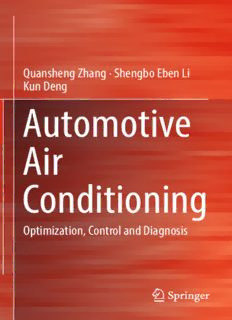
Automotive Air Conditioning: Optimization, Control and Diagnosis PDF
Preview Automotive Air Conditioning: Optimization, Control and Diagnosis
Quansheng Zhang · Shengbo Eben Li Kun Deng Automotive Air Conditioning Optimization, Control and Diagnosis Automotive Air Conditioning Quansheng Zhang • Shengbo Eben Li Kun Deng Automotive Air Conditioning Optimization, Control and Diagnosis With contributions from MarcelloCanova,ChangDuan,J.T.B.A.Kessels,QianJiang, SisiLi,StefanoMarelli,SimonaOnori,PierluigiPisu, StephanieStockar,TiezhiSun,P.P.J.vandenBosch, PengchuanWang,FenWu,ShaobingXu,ChengzhiYuan, DavidYuill,XiaoxueZhang 123 QuanshengZhang ShengboEbenLi CenterforAutomotiveResearch StateKeyLabofAutomotive TheOhioStateUniversity SafetyandEnergy Columbus,OH,USA DepartmentofAutomotiveEngineering TsinghuaUniversity KunDeng Beijing,China CoordinatedScienceLaboratory UniversityofIllinoisatUrbana-Champaign Urbana,IL,USA ISBN978-3-319-33589-6 ISBN978-3-319-33590-2 (eBook) DOI10.1007/978-3-319-33590-2 LibraryofCongressControlNumber:2016939397 ©SpringerInternationalPublishingSwitzerland2016 Thisworkissubjecttocopyright.AllrightsarereservedbythePublisher,whetherthewholeorpartof thematerialisconcerned,specificallytherightsoftranslation,reprinting,reuseofillustrations,recitation, broadcasting,reproductiononmicrofilmsorinanyotherphysicalway,andtransmissionorinformation storageandretrieval,electronicadaptation,computersoftware,orbysimilarordissimilarmethodology nowknownorhereafterdeveloped. Theuseofgeneraldescriptivenames,registerednames,trademarks,servicemarks,etc.inthispublication doesnotimply,evenintheabsenceofaspecificstatement,thatsuchnamesareexemptfromtherelevant protectivelawsandregulationsandthereforefreeforgeneraluse. Thepublisher,theauthorsandtheeditorsaresafetoassumethattheadviceandinformationinthisbook arebelievedtobetrueandaccurateatthedateofpublication.Neitherthepublishernortheauthorsor theeditorsgiveawarranty,expressorimplied,withrespecttothematerialcontainedhereinorforany errorsoromissionsthatmayhavebeenmade. Printedonacid-freepaper ThisSpringerimprintispublishedbySpringerNature TheregisteredcompanyisSpringerInternationalPublishingAGSwitzerland Preface Many engineering applications are based on vapor compression cycle, a complex thermodynamicprocessthatcannotbedirectlydescribedbylow-orderdifferential equations(ODEs).Suchsystemshavebeenstudiedextensivelyfromtheviewpoint ofnumericalsimulation.However,theoptimization,control,andfaultdiagnosisof suchsystemsisarelativelynewsubject,whichhasbeendevelopingsteadilyoverthe lastdecades,inspiredpartiallybyresearchadvancesinthemodelingmethodology ofmoving-boundarymethod. Thisbookpresents,inaunifiedframework,recentresultsontheoutputtracking, energyoptimization,andfaultdiagnosisfortheairconditioningsystemusedonon- road vehicles. The intent is not to include all of the developmentson this subject but,throughafocusedexposition,tointroducethereadertothetoolsandmethods that we can employ to improve the current control strategies on product system. Asecondobjectiveistodocumenttheoccurrenceandsignificanceofmodel-based optimization and control in automotive air conditioning system, a large class of applicationsthathavereceivedlimitedattentionintheexistingliterature,incontrast tobuildingheating,ventilation,andairconditioning(HVAC)system. The book is intended primarily as a reference for engineers interested in optimizationandcontrolofthermofluidsystem andthemathematicalmodelingof engineeringapplications. More specifically, the book focuses on typical layout of automotive air con- ditioning system. The book is organized into four sections. Part I focuses on control-orientedmodeldevelopment.Chapter1introducesthetraditionalmodeling approachof the thermodynamicsof heat exchangersin a passenger compartment. Chapter 2 exemplifies the model developmentprocess of an industrial project for automotive air conditioning system in heavy-duty trucks. Chapter 3 details the modelorderreductionmethodusedinbuildingHVACsystemthatmightshedlight on the difficulty of derivinglow-ordercontrol-orientedmodels. Part II focuses on control design for output tracking of cooling capacity and superheat temperature, two critical requirements on system performance. Chapter 4 presents the recent developmentofrobustcontrolofparameter-varyingmodel,apromisingframework that could be used to describe the air conditioning system dynamics at different v vi Preface coolingloads.Chapter 5utilizesthe H infinity synthesistechniqueto designlocal controllerensuringthetrajectoriesofthetwooutputstracked.Chapter6utilizesthe musynthesistechniquetoimprovethetrackingperformancewhenbothparameter and system uncertainties exist. Chapter 7 details the theory of mean-field control thatisprovedtoimprovebuildingHVACefficiencysignificantly.Chapter8details a specific optimalcontrol theory for constrained nonlinearsystems. Both theories have promising applications in the problem of output tracking in automotive air conditioningsystem. Part III focuses on the problem of electrified vehicle energy managementwhen the air conditioningload is considered.Chapter 9 presents the recent development of energy management strategy for hybrid electric vehicles when multiple-objective conflict and trade-off are required. Chapter 10 utilizes embedded method to design optimal operation sequence for mechanical clutch connectingthecrankshaftandcompressorinvehicleswithconventionalpowertrain. Chapter 11 utilizes hybrid minimum principle to design the optimal operation sequencewhenphasechangematerialisstoredinanevaporator.Chapter12details controllersforcruisingcontrolofhybridizedpowertrain.PartIVfocusesonthefault diagnosis of automotive air conditioning system. Chapter 13 presents the recent developmentoffaultdetectionandisolationmethods,aswellastheirapplications tovehiclesystems.Chapter14utilizesHinfinityfiltertodetectandisolateavariety of fault types, such as actuator fault, sensor fault, and parameter fault. Chapter 15 evaluates the performance of automated fault detection and diagnosis tools developedforbuildingHVACsystem. IamgratefultoMarcelloCanova,myadvisorintheDepartmentofMechanical and Aerospace Engineering at the Ohio State University, for having created a stimulatingatmosphereofacademicexcellence,withinwhichtheresearchthatled to this book was performed over my graduate study. I am also indebted to John Kessels from DAF Trucks, Professor P.P.J. van den Bosch from Eindhoven Uni- versityofTechnology,ProfessorChangDuanfromPrairieViewA&MUniversity, Professor Fen Wu from North Carolina State University, Professor Simona Onori from Clemson University, Professor Pierluigi Pisu from Clemson University, and ProfessorDavidYuillfromtheUniversityofNebraska. IwouldliketoexpressmygratitudetomyparentsHechuanZhangandXiuying Zhang for their affection and unquestioning support. The presence of my wife Marina Neklepaeva beside me made the completion of this book all the more gratifying. BloomfieldHills,MI,USA QuanshengZhang March8,2016 Contents PartI ModelDevelopment 1 CFD-BasedModelingofHeatTransferinaPassenger Compartment............................................................... 3 TiezhiSun,QianJiang,andPengchuanWang 2 ModelDevelopmentforAirConditioningSysteminHeavy DutyTrucks................................................................. 13 J.T.B.A.KesselsandP.P.J.vandenBosch 3 Aggregation-BasedThermalModelReduction ......................... 29 KunDeng,ShengboEbenLi,SisiLi,andZhaojianLi PartII Control 4 Robust H Switching Control of Polytopic 1 Parameter-VaryingSystemsviaDynamicOutputFeedback.......... 53 ChengzhiYuan,ChangDuan,andFenWu 5 OutputFeedbackControlofAutomotiveAirConditioning SystemUsingH Technique .............................................. 73 1 QuanshengZhangandMarcelloCanova 6 ImprovingTracking PerformanceofAutomotiveAir ConditioningSystemvia(cid:2)Synthesis..................................... 97 QuanshengZhangandMarcelloCanova 7 Mean-FieldControlforImprovingEnergyEfficiency ................. 125 SisiLi,ShengboEbenLi,andKunDeng 8 PseudospectralOptimalControlofConstrained NonlinearSystems.......................................................... 145 Shengbo Eben Li, Kun Deng, Xiaoxue Zhang, andQuanshengZhang vii viii Contents PartIII Optimization 9 Multi-Objective Supervisory Controllerfor Hybrid ElectricVehicles ............................................................ 167 StefanoMarelliandSimonaOnori 10 Energy-Optimal Control of an Automotive AirConditioningSystemforAncillaryLoadReduction............... 217 QuanshengZhang,StephanieStockar,andMarcelloCanova 11 Modeling Air Conditioning System with Storage EvaporatorforVehicleEnergyManagement ........................... 247 QuanshengZhangandMarcelloCanova 12 CruisingControlofHybridizedPowertrainforMinimized FuelConsumption.......................................................... 267 Shengbo Eben Li, Shaobing Xu, Kun Deng, andQuanshengZhang PartIV FaultDiagnosis 13 FaultDetectionandIsolationwithApplicationstoVehicleSystems.. 293 PierluigiPisu 14 Fault Detection and Isolation of Automotive AirConditioningSystemsusingFirstPrincipleModels ............... 323 QuanshengZhangandMarcelloCanova 15 EvaluatingthePerformanceofAutomatedFaultDetection andDiagnosisTools......................................................... 343 DavidYuill Index............................................................................... 359 Part I Model Development
Description: